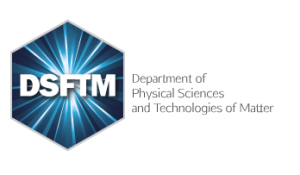

DSFTM has 11 Institutes and 41 branches in 15 regions, for a total of 1.200 staff members and far more students involved. DSFTM mission is to perform research in its own Institutes, to promote innovation and competitiveness of the national/international industrial system.
The research activities are coordinated through 7 research areas: advanced materials; sensors and devices; laser systems and photonic devices; quantum science and technologies; complex systems, soft matter and biophysics; Plasmas; Advanced Instrumentation and new methods and technology for the investigation of matter. Multi- and inter-disciplinarity are attained to develop the so-called “converging technologies”, NBIC (nano-bio-info-cogno), which represent the technological future and whose materials and devices macroarea is a pillar. Indeed, NBIC includes nanoscience and nanotechnologies, biotechnology and biomedicine, information technology, advanced computer science, communications and cognitive sciences as well as neurosciences; with applications ranging from communications to transport, from data elaboration and storage, to biology, medicine and cognitive science, from food and agriculture to the aero-spatial sector. Indeed, the Department manages a large number of patents (more than 114 between family patents and patent applications) and it is involved in 12 industrial spin-off activities.
Indeed, the Department manages a large number of patents (more than 114 between family patents and patent applications) and it is involved in 12 industrial spin-off activities.
By subscribing to the Newsletter, you will get constant updates about:

